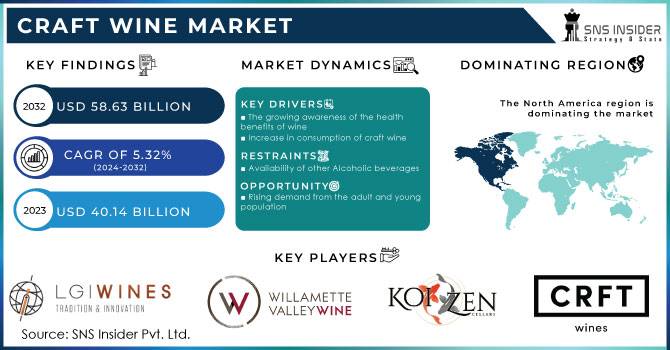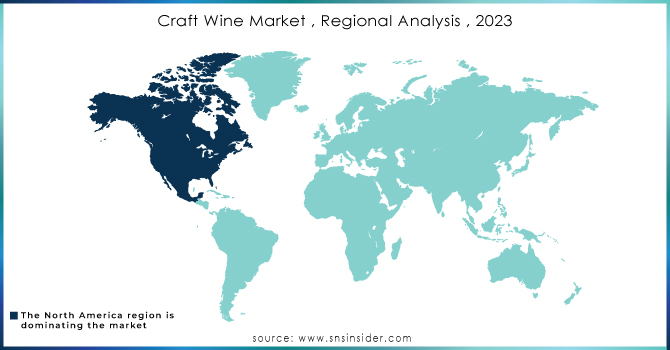Craft Wine Market Report Scope & Overview:

Get More Information on Craft Wine Market - Request Sample Report
The Craft Wine Market size was valued at USD 40.14 billion in 2023 and is expected to reach USD 58.63 billion by 2032 and grow at a CAGR of 5.32% over the forecast period of 2024-2032.
Craft wine has grown in demand due to an increase in demand for artisanal and natural products. Craft wine offers various potential health benefits owing to the organic substance in it, which has a bitter flavor, which is one of the major reasons for its popularity. The worldwide craft wine industry is expanding fast as consumer expenditure on healthy beverages such as craft wine rises.
Based on type, the market is segmented into still wine, sparkling wine, and others. The increasing demand for sparkling wine around the world makes it a dominant segment. Due to the huge demand for sparkling wine from the world's aging population, the market for it is expanding quickly. The Cava DO reported total sparkling wine sales of 260 million bottles in 2022.
Sparkling wine remains the exception, with imports up 12% in the first few months of FY 2022 when compared to FY2021, and supermarket revenue up 21% in the 2022 year compared to the same period in the previous year.
MARKET DYNAMICS
KEY DRIVERS
-
The growing awareness of the health benefits of wine
-
Increase in consumption of craft wine
Wine tourism is a growing trend, as consumers are interested in visiting wineries and learning more about the winemaking process. Increased global production of craft wine contributes to increased sales of craft wine. The global consumption of sparkling and still wine is predicted to exceed US$ 210 billion by 2022, for a total volume of 2.8 billion nine-liter cases, according to the IWSR beverages market study report. There are over 11,000 wineries in the United States. The demand for artisanal, regionally grown, and distinctive wines is rising. Also, the rise in premium wine consumption is the primary driver of the craft wine market's expansion.
RESTRAIN
-
Availability of other Alcoholic beverages
Consumers can now choose from a huge selection of craft alcoholic drinks, such as craft beer, artisan spirits, and craft cider. Craft wine is often more expensive than craft beer and spirits. Many grocery stores and liquor stores now sell craft beer and spirits. This makes them easier for customers to buy and may make them a more appealing alternative to craft wine. The market's growth is hampered by a shift in consumer product demand toward other craft beverages as a result of their rising availability.
OPPORTUNITY
-
Rising demand from the adult and young population
Increased demand among consumers for new flavors arose a chance for craft wine manufacturers to offer new varieties of craft wine such as red wine, rose wine, white wine, and others. Because of their taste and color, these flavors are in high demand among customers. Major industry players introduced new unique craft wines to the market, creating prospects for the craft wine market. Artisan wine industry leaders are experimenting with novel blending processes in their goods, which encourages consumers to buy artisan wines.
CHALLENGES
-
Fluctuation in prices of craft wine
-
Strict government regulations
Due to stringent government rules, including lockdown during the COVID-19 outbreak, social seclusion, and weather circumstances, several bars, vineyards, restaurants, and taprooms around the world were forced to close or destroyed in natural calamities may lead to a reduction in manufacturing capacities of wine. However, in many countries, distribution channels such as supermarkets and e-commerce sites offer home delivery services for craft wine and other alcoholic beverages.
IMPACT OF RUSSIA UKRAINE WAR
By volume, Russia continues to be the seventh-largest wine importer in the world. Craft wine exports have decreased as a result of the war's disruption of trade between these nations and the rest of the world. According to the International Organization of Vine and Wine, the $300 billion global wine industry is still recuperating from the pandemic and is being negatively impacted by the Russia-Ukraine war in terms of sales and production. Together, exports to the two nations made up 1.42% of the volume and 1.3% of Spanish revenue. Some of the major companies, including Swiss Glass Container, stopped making bottles at their facilities in Georgia and Hungary, while some wineries experienced a fall in sales as a result of fewer tourists doing wine tours.
IMPACT OF ONGOING RECESSION
The recession has negatively impacted the craft wine market. Inflation has led to a shift in consumer's preference toward other affordable beverages. According to a recent study by Rabobank, spirits and super-premium wines in the US are likely to survive a recession. According to IWSR data, Glass predominates in the packaging of spirits; volumes in the U.S. increased by 7% in 2022. As consumers' desire to "drink better" persists, this momentum is anticipated to continue over the next five years, with premium-priced brands particularly increasing ahead of the total category.
MARKET SEGMENTATION
By Type
-
Still Wine
-
Sparkling Wine
-
Others
By flavor
-
White Wine
-
Red Wine
-
Rose Wine
By Distribution channel
-
On-Trade
-
Off-trade
REGIONAL ANALYSIS
North America leads the global craft wine market due to the presence of prominent production key players in the region and the easy availability of high-grade craft wine in the form of beverages. This region leads due to the presence versatility and durability of artisan wine. In the upcoming years, Italy's market position in the global craft wine market will improve due to the rising demand for white and rose wine in the beverage industry.
Europe is the major market for craft wine due to the increase in the consumption of wine during various celebratory occasions, along with cultural significance. Due to the wide variety of flavors available in artisan wine, consumption is rising in many of Europe's main nations, including Germany, the United Kingdom, France, Italy, and Spain. Italy produced about 970 million bottles of sparkling wine in 2022, according to Unione Italiana Vini (UIV). The surge in craft wine exports is primarily to blame for the growth of 6.1%.
Asia Pacific is likely to exhibit growth in the market due to the adoption of premium wineries. Countries like China, India, and Japan are the potential markets due to their consumer base and increasing number of bars, wineries, and restaurants driving the growth.
Furthermore, Latin America the Middle East and Africa regional market is likely to hold the least craft wine market share due to low penetration. An increase in the acceptance and consumption of craft wine on special occasions helps to boost the regional growth of the craft wine market.

Get Customized Report as per Your Business Requirement - Request For Customized Report
REGIONAL COVERAGE
North America
-
US
-
Canada
-
Mexico
Europe
-
Eastern Europe
-
Poland
-
Romania
-
Hungary
-
Turkey
-
Rest of Eastern Europe
-
-
Western Europe
-
Germany
-
France
-
UK
-
Italy
-
Spain
-
Netherlands
-
Switzerland
-
Austria
-
Rest of Western Europe
-
Asia Pacific
-
China
-
India
-
Japan
-
South Korea
-
Vietnam
-
Singapore
-
Australia
-
Rest of Asia Pacific
Middle East & Africa
-
Middle East
-
UAE
-
Egypt
-
Saudi Arabia
-
Qatar
-
Rest of Middle East
-
-
Africa
-
Nigeria
-
South Africa
-
Rest of Africa
-
Latin America
-
Brazil
-
Argentina
-
Colombia
-
Rest of Latin America
KEY PLAYERS
Willamette Valley Wine, Chateau Niagara Winery, Koi Zen Cellars, House of Saka, LGI Wines, CRFT Wines, Clover Hill Wines, Treasury Wine Estate, Scotch Church Road Vineyard, Castle Group, Accolade Wines, E. & J. Gallo Winery, and other key players are mentioned in the final report.
RECENT DEVELOPMENTS
In 2023 Treasury Wine Estates Ltd. launched its first wine from China in the famous 2023 Penfolds Collection called the Chinese Winemaking Trial (CWT), also solidifying its long-term commitment to China's wine sector.
In 2023 Rinna Wines introduced Brut and Brut Rosé sparkling wines. Rinna Wines has finalized a collaboration with Prestige Beverage Group to introduce its wine and set its distribution network in seven states.
In 2023 A new craft wine business has opened in the Dayton region. A wine boutique that has been in the works for several years has found a home in a Miami Valley suburb. The boutique is scheduled to open in the spring of 2023.
| Report Attributes | Details |
| Market Size in 2023 | US$ 40.14 Billion |
| Market Size by 2032 | US$ 58.63 Billion |
| CAGR | CAGR of 5.32% From 2024 to 2032 |
| Base Year | 2023 |
| Forecast Period | 2024-2032 |
| Historical Data | 2020-2022 |
| Report Scope & Coverage | Market Size, Segments Analysis, Competitive Landscape, Regional Analysis, DROC & SWOT Analysis, Forecast Outlook |
| Key Segments | • By Type (Still Wine, Sparkling Wine, and others) • By flavor (White Wine, Red Wine, and Rose Wine) • By Distribution channel (On-Trade and Off-trade) |
| Regional Analysis/Coverage | North America (US, Canada, Mexico), Europe (Eastern Europe [Poland, Romania, Hungary, Turkey, Rest of Eastern Europe] Western Europe] Germany, France, UK, Italy, Spain, Netherlands, Switzerland, Austria, Rest of Western Europe]), Asia Pacific (China, India, Japan, South Korea, Vietnam, Singapore, Australia, Rest of Asia Pacific), Middle East & Africa (Middle East [UAE, Egypt, Saudi Arabia, Qatar, Rest of Middle East], Africa [Nigeria, South Africa, Rest of Africa], Latin America (Brazil, Argentina, Colombia Rest of Latin America) |
| Company Profiles | Willamette Valley Wine, Chateau Niagara Winery, Koi Zen Cellars, House of Saka, LGI Wines, CRFT Wines, Clover Hill Wines, Treasury Wine Estate, Scotch Church Road Vineyard, Castle Group, Accolade Wines, E. & J. Gallo Winery |
| Key Drivers | • The growing awareness of the health benefits of wine. • Increase in consumption of craft wine |
| Market Challenges | • Fluctuation in prices of craft wine • Strict government regulations |

